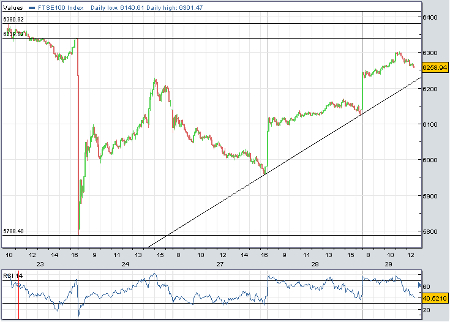Flying FTSE 100 dismisses Brexit threat
29th June 2016 13:04
by Lee Wild from interactive investor
Share on
At this rate, the FTSE 100 will soon hit last Thursday's pre-Brexit peak. It could easily happen tomorrow if the market remains in this mood. With nothing new known about either the effect of the exit process on the economy, or the impact of Brexit on company profits, this two-day surge seems absurd. So what is driving this risk-on rally?
Well, it could be short-covering, although heavyweight investors who wanted to have had plenty of time to close out short positions taken before the referendum result.
Bargain hunting must explain much of it, with certain sectors - housebuilders, banks and insurers in particular - appearing to scream value. Smashed in the rout and still nursing horrific losses, investors have been piling in since yesterday, and remain enthusiastic.
Housebuilders and trade on just seven times forward earnings and yield 9% and 8% respectively. Where else can you get returns like that?
Investors love , too. A price/earnings (PE) ratio of less than eight times and prospective yield of almost 8% has got them excited, despite the threat of a dividend cut post-Brexit.
And check out high-yielding insurers , and on PEs of seven to eight times, and even , on a comparatively hefty 10 times earnings, still looks cheap on paper. The Pru, especially, is expected to keep generating double-digit growth, and with 75% of earnings from outside the UK, the strong dollar is a big boost to profits.
Of course, there's no doubt that on current estimates many FTSE 100 stocks look cheap. But that is based on what's expected now. If Brexit happens, those forecasts are vulnerable and stocks will not appear so cheap.
So, after starting the week in depressed mood, the FTSE 100 has recovered 320 points since Monday's close to 6,300, adding another 160 points on Wednesday. Remember, the blue-chip index closed at 6,338 on polling day, having peaked at 6,380 earlier in the session. Only an hour before the close it had traded at 6,275.

Will Brexit even happen?
The clear appetite for risk in what should be a risk-off environment suggests the market believes Brexit will have little impact on business in the near-term. But there is an increasing sense in the Square Mile and beyond that Brexit might not even happen, which means "business as usual" for most corporates.
"We think any UK exit from the EU will take until 2019 at the earliest, with some suggestions that any deal may not be ratified until the next scheduled General Election in 2020," wrote broker Stifel Wednesday.
"Indeed, we wonder if the exit will ever occur, with the possibility of an earlier election and perhaps an alliance of parties standing on a pro-EU platform."
For now, this is all about politics. David Cameron's decision not to invoke Article 50 - which would start the clock on the two-year EU exit process - could make it very difficult for prime minister Boris Johnson to make Brexit a reality.
With a break-up of the United Kingdom a very real risk, it seems inconceivable that a new unelected leader of the country would not be forced to call a General Election.
In yesterday's Evening Standard, revered commentator Anthony Hilton urged Britain to take Angela Merkel's advice and stay cool, "there is still a chance that something worthwhile can be salvaged".
And in today's Financial Times, chief economics writer Martin Wolf writes: "…leaving the EU and seeking to retain current access to the single market, while accepting free movement of labour, would be mad. If the UK were willing to accept all this, it should stay inside the EU, since it would continue to possess a voice in the single-market regulations that would affect it."
"Right now, however, the best thing to do is nothing…Any such stalemate cannot continue forever. But there could be benefits, for both sides, in avoiding too hasty and brutal an ending."
If politicians play this right, the worst possible outcome can be avoided. That's still a big "if", though, and colossal risk remains. As my colleague and Interactive Investor's head of investment, Rebecca O'Keeffe, wrote this morning: "With global central banks all trying to reassure markets, prices are stabilising and volatility is falling.
"However, it is still very early in the process and significant political and market risks remain, so we may start to see some investors start to sell the rally, which could see markets pare back some of the gains."
Unless there's an improbable turn of events in favour of continuing access to European markets on profitable terms, Rebecca's forecast seems the most likely outcome near-term.
This article is for information and discussion purposes only and does not form a recommendation to invest or otherwise. The value of an investment may fall. The investments referred to in this article may not be suitable for all investors, and if in doubt, an investor should seek advice from a qualified investment adviser.